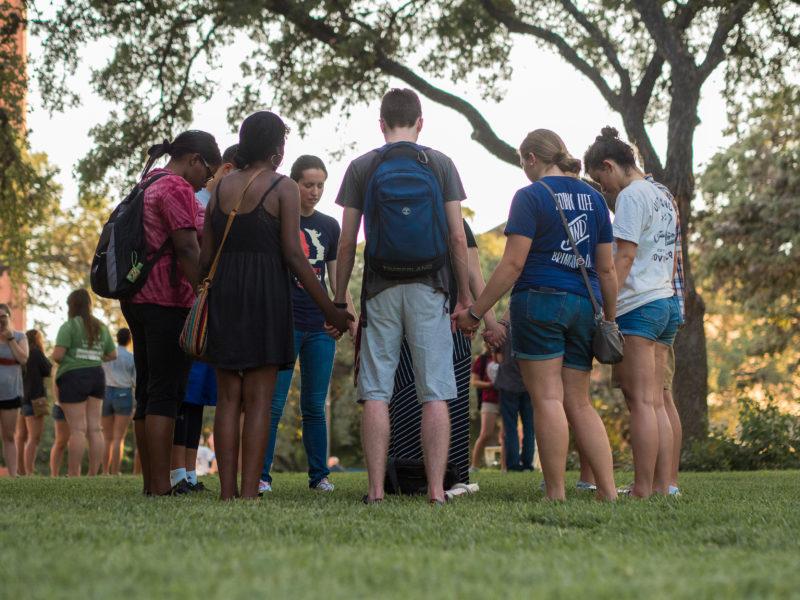On Monday, Aug. 21, the Humanities Collective offered a space for the Trinity community to gather and stand in solidarity with the victims of the Charlottesville riot, the Barcelona attack and other acts of violence. Students, faculty and staff were welcomed to the Miller Fountain to speak their minds about the recent events, to participate in respectful silence and to stand against hatred.
The Humanities Collective is a group of faculty and students who act as a source for anything humanities related, both on campus and within the San Antonio community. They planned this event without hesitation to show their support for those affected both directly and indirectly by the acts of violence.
“Humanities, although it is an academic area “” distinguished from the sciences, connected to the arts, et cetera “” nonetheless also represents a kind of value system, humanistic values,” said Benjamin Stevens, visiting assistant professor of classical studies and outreach coordinator of the Humanities Collective. “So, it seemed reasonably clear that one way we could kind of put the humanities forward is to be in support of people who have been affected badly by hate, to be against hate and in favor of sort of loving diversity in a community like Trinity’s and like San Antonio’s.”
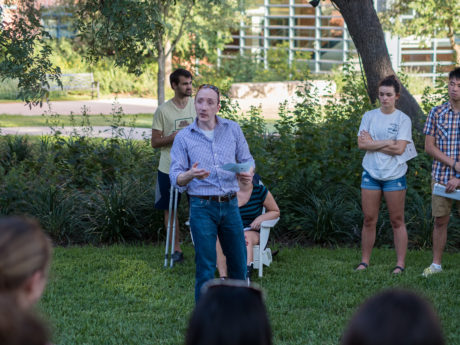
The concept of the vigil began when a few members of the collective were unable to attend a similar rally in Austin due to obligations on campus. They decided that everyone who was required to be on campus during New Student Orientation should still be able to express their sympathy.
“We started talking, and that sparked the conversation of whether or not there was something we could do here of similar impact and address the same issues,” said Hannah Rusher, senior and student outreach associate of the collective. “Maybe we can be able to, through faculty representation, go to show that these are the values of Trinity and the guidelines we hope our community will respect while they’re here.”
The Humanities Collective emphasizes the importance of leadership on campus, whether it involves students joining pre-existing clubs or initiating an event like this. Trinity provides the resources for students to realize ideas like this vigil.
“The main thing we hope is clear is that Humanities Collective is just one organization making use of the opportunity that Trinity provides to do these sorts of things in response to current events and ongoing crises, et cetera, and that opportunity is real,” Stevens said. “If students feel that particular issues in the world are not being addressed officially on campus, the door is open for them to approach the administration, staff, faculty and others and raise awareness.”
Dozens of students and faculty attended the vigil, each there for similar reasons “” to be respectful, to show support and to take advantage of their privilege and use it to emphasize voices that go unheard.
“I feel like a lot of people want to show other people that we’re not all in the same mindset as the people who were protesting. There are a lot of people who believe that everyone is equal and that everyone deserves a fair chance,” said Arianna Siddiqui, a first-year who attended the vigil.
In creating the event, both Stevens and Rusher had anticipated that the vigil would show incoming students that Trinity is a place for all to feel safe and a place for students to take advantage of their voices. Rusher said she hoped first-years would pass by and see upperclassmen and faculty standing for what they believe in.
“I come from a Muslim family “” my parents are “” and it can be rough growing up because you’ll encounter some things that made you pause and wonder if you’re wanted here, and growing up, that really sucked,” Siddiqui said. “I wanted to come to some place that didn’t care about your religion and accepts everybody, so being here really shows me that Trinity was the right decision. Being here reaffirms my decision that this is a place I can be safe and happy for all four years.”
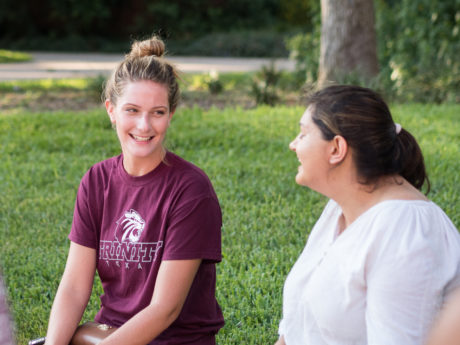
One senior expressed a similar feeling towards Trinity’s welcoming community.
“It’s important. If we’re a community, I think when something happens, even if you don’t feel directly involved, it’s nice to show your support, and it’s nice to have unity,” said Faith Deckard, who spoke during the vigil and is also a member of the Black Student Union (BSU). “I think this shows that we care and that we value all human life, and I want to be at a university that feels that way.”
Many agreed that unity and support for one another is the only answer in times of injustice and hatred. A vigil like this one shows that Trinity values its community and those in it above all else.
“I think that if things are going to change, we need everybody involved “” people of all ages, young people, professors “” and I think this is really a great step,” said Aaron Delwiche, professor of communication. “This is a way for the community to connect and to listen to each other and kind of gear up for the year ahead.”
Of the many difficulties surrounding acts of violence and injustice like the riots in Charlottesville, Deckard thinks prejudiced labels should be the first we conquer.
“Labels are very powerful. Words are powerful, and they all carry assumptions, expectations, stereotypes. Sometimes a label becomes so large that we no longer see the person, we just see the label and what we think it means. If we’re ever going to make any progress, we have to get past the labels,” Deckard said.
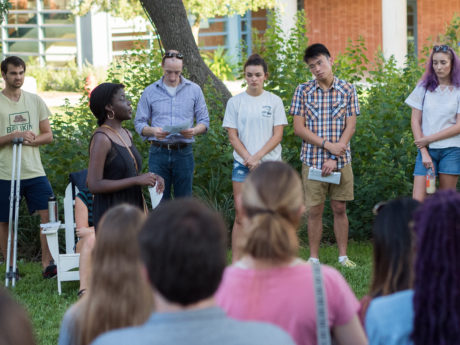
Tahlar Rowe, a senior and president of BSU, spoke to the crowd about how, in times like this, she feels alone. She emphasized the importance of each other’s support and reminded everyone that racism happens every day, and that it shouldn’t take racism at this level for people to realize that it’s happening everywhere.
“If there’s something I can stress to you all, it’s to support one another, educate those around you who aren’t paying attention. A lot of us are hurting, and a lot of us are affected by this, and it can affect our academics and our enthusiasm,” Rowe said.
Danny Anderson, president of the university, also stepped forward to add to the conversation.
“I encourage you to think about being a part of the community, a part of the encouragement that Tahlar was talking about, a part of living beyond labels that Faith was talking about. Those are ways that being a part of a community like this asks us to shine a light so that we can dispel darkness,” Anderson said.
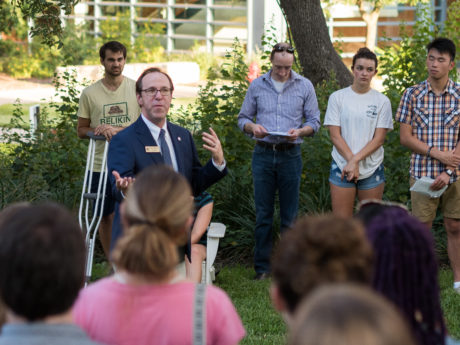
Before the vigil ended, Deckard stood up one more time to address what she thinks is the most important thing to take from such acts of violence.
“We can’t get comfortable. I’ve heard so many times that things aren’t perfect, but America is the best we’ve got, and that even though people are getting shot, at least they aren’t in chains,” Deckard said. “We say that like it’s enough, and I’m not ignoring that we have made progress, and it warms my heart that we have made progress, but I’m not satisfied with that answer. There’s still progress to be made. There’s still change to happen. It’s just going to depend on us putting the action forward. We can’t get comfortable.”

